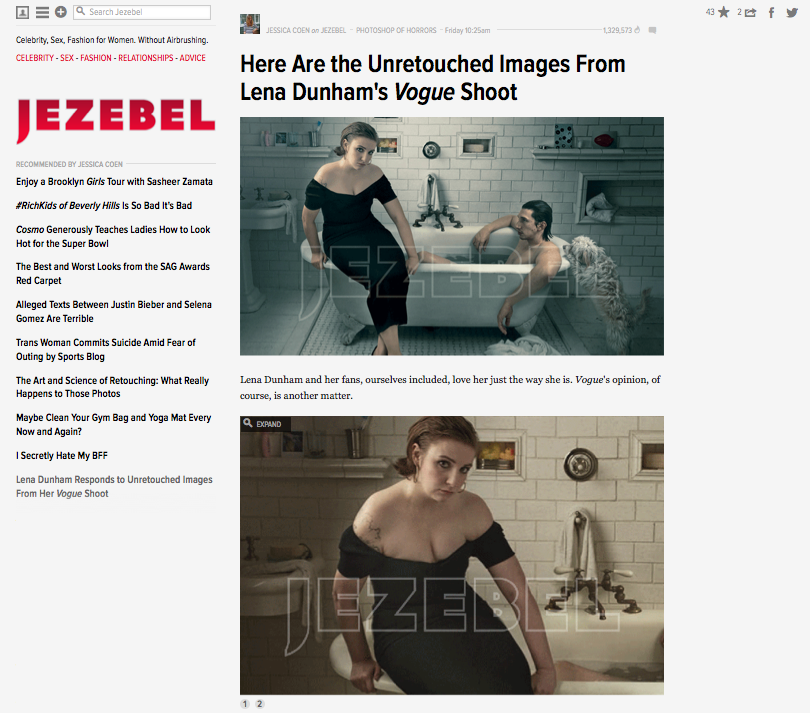I don't watch Girls and I don't read Vogue, so the recent controversy involving Girls' Lena Dunham and her appearance in the glossy magazine failed to catch my eye. However, when Amateur Photographer reported that Annie Leibovitz is threatening legal action over the unsanctioned publication of the shoot's original image files, my interest was piqued. Dunham appeared on the cover of, and inside, American Vogue's February edition (we weren't treated to her here in the UK) in a shoot by Annie Leibovitz that raised plenty of eyebrows and plenty of questions. Some people were perplexed by the apparent clash of principles when a feminist role-model could appear in and on the cover of a magazine that is famed for its stylised and heavily post-produced shoots. Other people wondered why Vogue had opted for a head-and-shoulders shot of a woman known for not being the archetypal Hollywood stick-instect, rather than the usual full-body shot for its cover. And some people just worried about the Photoshop job.
One of the publications most vocal about Dunham's dalliance with Vogue was Jezebel, the feminist blog. Jezebel is highly critical of Vogue's use of idealised, unrealistic images of women that are presented as objections of perfection. While it supported the notion that Vogue could feature a woman who was not its usual front page fodder, it was critical of Dunham being tweaked to make her acceptable for that role: 'Dunham embraces her appearance as that of a real woman; she's as body positive as they come. But that's not really Vogue's thing, is it? Vogue is about perfection as defined by Vogue, and rest assured that they don't hesitate to alter images to meet those standards.'
Jezebel then offered a bounty of $10,000 for Leibovitz's original, unedited image files of Dunham so that it could do a compare-and-contrast. From Jezebel's perspective, this wasn't intended to shame Dunham or criticise her for working with Vogue, although even if it wasn't intentional it's still easy to construe it that way. It's a topsy-turvy version of damning with faint praise. When Vogue is renowned for its fantastical presentation of women, why pick on Dunham's shoot to explore how far it will go if it isn't intended as a criticism of her actions?
Nevertheless, Jezebel got what it asked for.

Someone, somewhere, produced the original images and Jezebel was able to lay them side-by-side with the edited versions. Were they extensively retouched? Retouched, definitely. Extensively? That depends on your definition of the word. There's a whole lot more adjustment going on there than I'd make to one of my photos, but I don't shoot for the cover of Vogue and I'm not in the habit of photographing TV stars with pigeons on their heads or posing on the sides of baths wearing evening gowns. As Dunham said to Slate: 'A fashion magazine is like a beautiful fantasy. Vogue isn't the place that we go to look at realistic women, Vogue is the place we go to look at beautiful clothes and fancy places and escapism... '
The furore of whether Dunham should or shouldn't have posed for Vogue, whether or not she's betrayed the feminist ideals that so many seem to have ascribed to her, and just how much alteration the images have undergone has now taken a new twist. For Annie Leibovitz is reportedly extremely unhappy that the unretouched images have made their way to publication and is considering legal action. Precisely what legal action she intends to make, against whom, is unclear. But sources close to Leibovitz claim that she would never have sanctioned the publication of the original images. Vogue has declined to comment and Jezebel has stated that it obtained the images via an anonymous source.
What do I think? I studied history at university. Then I trained to teach it. And I taught it for a bit, too. I'm often asked how I can bear to watch historical dramas without picking holes in their accuracy. My answer is always the same: 'It's a story, not reality.' I don't advise that anyone should take medical advice from a BBC hospital drama, either. When I glance at Vogue, or any other glossy magazine, I treat it in much the same manner. It's a fantasy that deserves the same suspension of disbelief as a film or TV show. It doesn't matter if it's Vogue or Homes and Gardens, it's not reality. When you've resurfaced from your dive into stylised perfection, that's what you need to remember.
(Headsup to Amateur Photographer)
